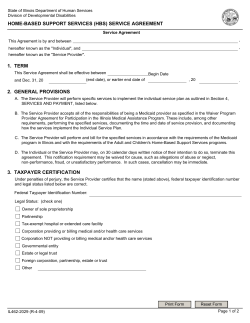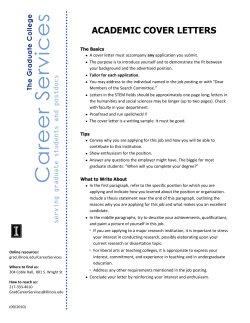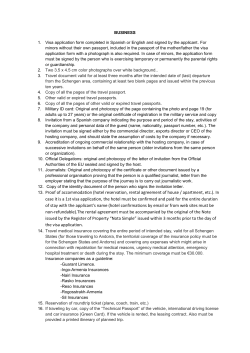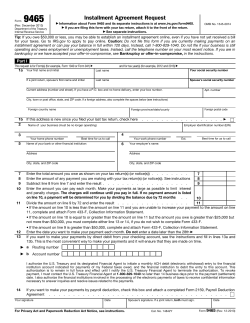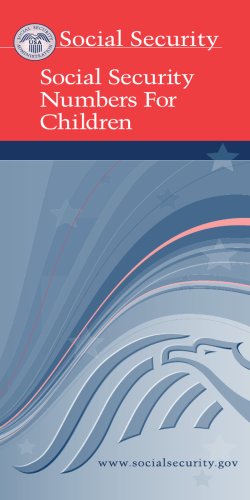
Welcome to the Illinois Child Care Assistance Program (CCAP)
State of Illinois Rod R. Blagojevich, Governor Department of Human Services Carol L. Adams, Ph.D., Secretary Welcome to the Illinois Child Care Assistance Program (CCAP) a child care provider’s guide Welcome! As a child care provider, your participation in the Illinois Child Care Assistance Program makes it possible for Illinois children to enjoy the benefits of quality child care. We appreciate your contribution. The Illinois Department of Human Services (IDHS) and your local Child Care Resource and Referral (CCR&R) agency understand that the procedures and paperwork can be confusing. The information in this brochure is provided to help you navigate and make the most of the services available to you. If you have any questions, or need clarification, please call your local CCR&R. We’re here for you! 2 Getting started The benefits of being licensed While being a licensed child care provider is not necessarily an indication of quality, there are some benefits. Becoming licensed shows parents that you are meeting the minimum health and safety standards set by the Department of Children and Family Services (DCFS). By being licensed you will also receive higher daily rates from the Illinois Child Care Assistance Program, and may be eligible to apply for certain state grants and incentives. In addition to information and assistance with licensing, your local CCR&R offers a wide variety of training and support to help you expand your skills and create safe, developmentally appropriate environments for Illinois children. Call them to find out more! Provider registration As part of the application process, all licensed-exempt home providers must submit copies of their Social Security Card and a copy of a photo I.D. (Illinois driver’s license, Illinois state I.D. or military I.D.) The approval letter After a parent has been approved for the Illinois Child Care Assistance Program, and has selected you as their child care provider, an approval letter is mailed to both you and the parent. This letter contains important information including: n The length of time the parent is eligible for the program; n The amount of the parent’s monthly co-payment; n The children who are eligible for the program; n The number of days per week that IDHS will pay you; n The daily rate at which you will be paid. Each approval letter is different—read each carefully because monthly co-payment amounts or eligibility information can change. Divide the co-payment amount by 4.333 if you want the parent to pay a weekly amount instead of monthly. 3 The approval period Each approval letter will list the first and last date that the parent is eligible for child care assistance. Parents are usually approved for 3 or 6 months at a time; however, approval periods may vary based on the length of the approved school or training program they may be attending. It is very important that parents submit their application for child care assistance as soon as possible. Services can be backdated a maximum of seven days from the date an application is received at the Child Care Resource and Referral agency. Parents must periodically renew their child care case in order to continue receiving assistance. To do this, the parent must complete a “redetermination” form. This form is mailed to parents the month before their approval ends. For example, if a parent is approved through April, he or she should receive the redetermination form in March. If the parent doesn’t return the redetermination form, or if he or she no longer meets the eligibility guidelines of the program, a Notice of Cancellation will be sent to the parent and provider and the case will not be renewed. As the provider, you are responsible for collecting payment from the parent for any child care provided before or after the dates listed on the approval letter. If you do not receive a new approval letter— with new start and end dates—you should not expect any further payments from IDHS. Record keeping hints and tips Careful record keeping will make a positive impact on your business, your relationship with parents and the care you provide. The following list of hints and tips have been developed specifically with you in mind: n Have a list of policies or procedures that you want parents to follow and give each parent a copy. Ask parents to read and sign a copy for your files. n Have parents sign a form which lists who has authority to pick up their children. n Have parents sign in each day they bring their children to your home or business and sign out at pick up. n Use a calendar to keep track of which days and times you care for each child. n Make a separate file for each family. n Write the parent’s ending eligibility date on the outside of the folder so you can easily access it. 4 n Keep the following in each family’s file: n A copy of the parent’s application along with any attachments n The parent’s approval notices n A copy of each monthly billing certificate n Any cancellation notices received n The voucher that comes with each of your monthly checks n Any other forms or notices you receive that pertains to the family n Give the parent a receipt each time a co-payment is paid and keep a copy of the receipt in the child’s file. n Discuss health issues or concerns with each child’s parents. Keep a record of the conversation in their child’s file. n Keep detailed records of all child care expenses. Many expenses, such as supplies and food purchased to feed children in your care, are tax deductible. Changing your address It is your responsibility to notify the Child Care Resource and Referral agency when you change your address. The notification of address change must be in writing and signed by you and the parent(s). If your address is not current, your payments may be delayed and you may not receive important notices regarding a parent’s case. Child abuse and neglect background check Illinois law states that if you are paid by the state to provide child care and you are not a licensed provider, you must agree to a Child Abuse and Neglect background check every two years. This background check will match your name and other pertinent information, as well as that of anyone age 13 or older in the place care is being provided against the Child Abuse and Neglect Tracking System (CANTS) maintained by DCFS. 5 Monthly co-payments What is a monthly co-payment? The monthly “co-payment” is the portion of child care costs that the parent is responsible for paying to you, their provider. It is your responsibility to collect this amount directly from the parent. How are co-payment amounts determined? Monthly co-payment amounts are determined by IDHS and are based on the number of people in the family, the number of children receiving child care and the schedule of the children in care. The monthly co-payment amount is listed on the parent’s approval letter. Read each approval letter carefully–monthly co-payment amounts may change! Co-payment changes can occur each time a parent’s case is renewed (redetermined) or if there is a change in the parent’s income, the number of people in the family, the number of children in care, or the schedule of care provided. You will receive a new approval letter anytime a monthly co-payment changes so you know how much to collect. Neither you, nor the parent, should adjust the monthly co-payment. If you think that an adjustment is necessary, you or the parent should contact your local Child Care Resource and Referral agency for help with the next steps. How are monthly co-payments collected? How and when you collect the monthly co-payment is between you and the parent. All payment arrangements should be agreed upon before care starts. The monthly co-payment amount is deducted from the payment you receive from IDHS. If you don’t collect the monthly copayment from a parent, you will not receive full payment. If a parent has more than one child care provider, only one provider will collect the monthly co-payment. If you have been assigned to collect the monthly co-payment, the amount will be printed on the approval letter you receive. If you are not assigned to collect the monthly co-payment, nothing will be deducted from your child care payment from IDHS. There will be no co-payment amount listed on your approval letter. 6 You may find the following suggestions for collecting monthly copayments helpful: n Collect the entire co-payment at the beginning of each month. Set a schedule for when payments are due—and stick to it! n Ask for a one-week deposit. This way you will always be ahead in collecting the co-payment. n Keep, and give, receipts for all co-payments made by a parent. Getting paid Your participation in the Illinois Child Care Assistance Program makes it possible for Illinois children to enjoy the benefits of quality child care. We understand that you work hard to provide that care, and we want to make sure that you are paid in a fair and timely manner. The following questions and answers are provided to help you understand how the payment process works and what you can do to help things run smoothly. Your local Child Care Resource and Referral agency will handle your child care payments and can answer any further questions you may have about the program. How much will I be paid? Payments or “rates” are determined by IDHS based on whether you are a child care center, licensed home provider or license-exempt provider, and the age of the child. Your daily rate is also based on the number of hours a child is in care: n Full-day rate: child is in care 5-12 hours per day. n Part-day rate: child is in care under 5 hours per day. n School-age rate: school-aged child in care under 5 hours per day while school is in session. Make sure you discuss these rates with the parent before you begin care. It is illegal to bill the state a higher rate than you charge your private paying parents. How many days a week will I be paid? IDHS will pay you for the days and times you provide care while the parent is working; attending an approved school or training program; and traveling to and from work or school. 7 The number of days per week that a parent is approved for will be on his or her approval letter. The number of approved days is based on the parent’s work and/or school schedule and check stubs that the parent submits with the child care program application. When will I get my first payment? It can take 4 to 8 weeks for you to receive your first payment. After you receive your first payment, regular payments will come on a monthly basis. Your first payment takes longer because your name and social security number need to be recorded with the Illinois Office of the Comptroller before any payments can be made. To do this, the CCR&R will mail you a W9 tax form. The sooner you complete and return your W9 form, the sooner you can get paid. Mail the completed W9 form to your CCR&R. They will make sure it gets to the Illinois Office of the Comptroller. After the Illinois Office of the Comptroller has your information on file, the CCR&R can send you your first billing certificate. This is the form that tells IDHS how much to pay you. What is the payment process? Typically, payment for child care services that you provide in one month will arrive in the middle of the following month—about 3 weeks after the CCR&R receives the completed billing certificate. To make this process easy to understand, we’ve broken it down to 5 steps: n STEP 1 You receive a billing certificate. You’ll receive a monthly “Child Care Certificate” in the mail for each family you care for. Centers receive a “Center Certificate Report” listing all the families together. This should arrive during the last week of every month. n STEP 2 You and the parent complete and mail the certificate. On the Certificate, you’ll be asked to write in the number of days during that month that you cared for each child. You and the parent must make sure the correct number is listed for each child. There will be a space for both you and the parent to sign. Centers receiving a Center Certificate Report are not required to submit parent signatures. After the last day of the month, mail the certificate or enter the payment by phone by using the IDHS Child Care Telephone Billing System. For more information about the telephone billing system contact your local CCR&R agency. 8 n STEP 3 Your payment information is “entered.” After your certificate is received at the CCR&R, your payment information will be entered into a state computer system. n STEP 4 Payment is “vouchered” through IDHS. The Department of Human Services processes your payment information and forwards it to the State Comptroller’s office. n STEP 5 Office of the Comptroller prints and mails your check. Please note that neither the Child Care Resource and Referral agency nor IDHS issue checks. What could delay my payments? Although we do our best to make sure that providers are paid in a timely manner, your payments could be delayed if: n You do not complete and return the W9 tax form as soon as possible; n You do not notify the CCR&R when you change your address; n Your billing certificate is not complete if it is not signed in ink; n You ask to be paid for more days than a parent is eligible; n Your mail is undeliverable because your name is not on your mailbox; n The CCR&R does not have your apartment number and your check is returned by the Post Office as "undeliverable" How can I check on the status of my payment? IDHS has a toll free number providers can call to find out payment information. If you have a touch-tone phone, you can call 1-800804-3833 to find out if your payment has been entered by the Child Care Resource and Referral agency and mailed by the State Comptroller. This toll free number is available 24 hours a day, seven days a week. You can also get payment information by visiting the state comptroller’s web site at: www.comptroller.state.il.us and select “vendor payments.” What if I don’t receive my monthly billing certificate? Be patient and don’t panic. Certificates are mailed from Springfield and take 5-7 days to arrive. If you don’t receive a billing certificate, it may be that the parent’s eligibility period has ended. If you don’t receive a billing certificate by the last day of the month, your Child Care Resource and Referral agency can mail you a new one. Make sure your name is on your mailbox and that you notify them any time you change your address. 9 Are my child care payments taxable income? Yes. When you file your taxes, you are required by law to report all child care payments to the IRS as earned income. Taxes cannot be taken out of the checks you receive. If you are paid at least $600 within a year, you will receive a 1099 form stating the child care income you earned for the year. You should receive your 1099 form by February 15th. It’s a good idea to set aside money each month for taxes that may be due at the end of the year. You may be responsible for quarterly tax payments, or eligible for the earned income tax credit. For general tax information, and to see if you qualify for the earned income tax credit, you can call the IRS at 1-800-829-1040 (TDD/TTY 1-800-829-4059). Should I consider direct deposit? Absolutely. Your payments can be deposited directly into your bank account. This can be especially helpful if you have been having trouble with your mail. Call 217-557-0930 to set up direct deposit. For purposes of record keeping, you may want to ask your bank what kind of payment receipt information they can pass on to you, as you will not receive a voucher from IDHS or the comptroller’s office when using direct deposit. 10 Your rights and responsibilities As a child care provider for parents participating in the Illinois Child Care Assistance Program, you have specific rights and responsibilities. It is important that you read and understand your rights and responsibilities, as any misunderstanding could affect your payments. Your rights: n To be notified by mail if a parent’s case is approved, renewed, canceled, denied or if additional information is needed to start or continue the parent’s child care assistance. n To be notified by mail of any changes in monthly co-payments or in the number of days that you are eligible to be paid. n To receive friendly and professional customer service. Your responsibilities: n n n n n n n n To notify your Child Care Resource and Referral agency if you move. To notify DCFS when you move if you are a licensed provider. To make sure that your child care certificate (billing form or report) is complete, includes the correct number of days the child(ren) attended and if required, is signed in ink by both you and the parent every month. To keep a written record of the days and hours that you provide care for each child and to bill the state for only those days and hours. To read the approval letters you will receive from the state so that you know the amount of each parent’s monthly copayment, your pay rate, and the number of days per week that you are eligible to receive payments. To collect each parent’s assigned co-payment every month. To report all child care payments, including parent co-payments, to the IRS as earned income. To keep the number of children in your care within your legal capacity. 11 For more information: Call or visit your Illinois Department of Human Services’ Family Community Resource Center (FCRC). If you have questions about any Illinois Department of Human Services (IDHS) program, call or visit your FCRC. We will answer your questions. If you do not know where your FCRC is or if you are unable to go there, you may call the automated helpline 24 hours a day at: 1-800-843-6154 1-800-447-6404 (TTY) You may speak to a representative between: 8:00 a.m. - 5:30 p.m. Monday - Friday (except state holidays) For answers to your questions, you may also write: Illinois Department of Human Services Bureau of Customer and Provider Assistance 425 South 4th Street Springfield, Illinois 62701 Visit our web site at: www.dhs.state.il.us For more information on finding quality child care and getting financial assistance, call the Illinois Network of Child Care Resource and Referral Agencies (INCCRRA) at: 877-20-CHILD [877-202-4453] (Voice) 800-649-1884 (TTY) Programs, activities and employment opportunities in the Illinois Department of Human Services are open and accessible to any individual or group without regard to age, sex, race, sexual orientation, disability, ethnic origin or religion. The department is an equal opportunity employer and practices affirmative action and reasonable accommodation programs. DHS 4612 (N-03-07) Illinois Child Care Assistance Program: Provider’s Guide Printed by the Authority of the State of Illinois 25,000 copies P.O.# 0316
© Copyright 2026

